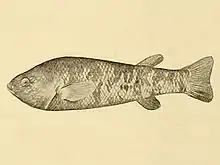Ash Meadows killifish
The Ash Meadows killifish (Empetrichthys merriami) is a species of killifish from the subfamily Empetrichthyinae, part of the family Goodeidae,[2] which was first documented by C. H. Gilbert in 1893 and historically occupied numerous springs near Ash Meadows, Nye County, Nevada, United States. This species was last seen in 1948 and is believed to have gone extinct in the early 1950s, likely as a result of habitat alteration and competition with and predation by introduced crayfish Procambarus clarkii, mosquitofish (Gambusia affinis), black mollies (Poecilia sphenops), and bullfrogs (Rana catesbeiana).[3]
| Ash Meadows killifish | |
|---|---|
 | |
| Scientific classification | |
| Domain: | Eukaryota |
| Kingdom: | Animalia |
| Phylum: | Chordata |
| Class: | Actinopterygii |
| Order: | Cyprinodontiformes |
| Family: | Goodeidae |
| Genus: | Empetrichthys |
| Species: | †E. merriami |
| Binomial name | |
| †Empetrichthys merriami C. H. Gilbert, 1893 | |
The common name of the genus Empetrichthys has since been changed from killifish to poolfish.[3]
The specific name honours the American naturalist and physician C. Hart Merriam (1855–1942), who led the Death Valley (California, USA) expedition, during which he and Vernon Orlando Bailey (1864–1942) co-collected the type.[4]
References
- NatureServe (2013). "Empetrichthys merriami". IUCN Red List of Threatened Species. 2013: e.T7705A15364173. doi:10.2305/IUCN.UK.2013-1.RLTS.T7705A15364173.en. Retrieved 20 November 2021.
- Froese, Rainer; Pauly, Daniel (eds.) (2019). "Empetrichthys merriami" in FishBase. April 2019 version.
- The Goodeid Working Group. "Empetrichthys merriami". Retrieved 4 September 2012.
- Christopher Scharpf; Kenneth J. Lazara (26 April 2019). "Order CYPRINODONTIFORMES: Families PANTANODONTIDAE, CYPRINODONTIDAE, PROFUNDULIDAE, GOODEIDAE, FUNDULIDAE and FLUVIPHYLACIDAE". The ETYFish Project Fish Name Etymology Database. Christopher Scharpf and Kenneth J. Lazara. Retrieved 17 September 2019.
